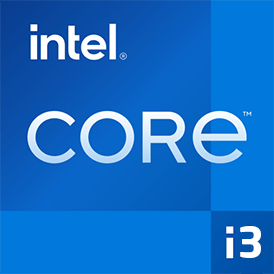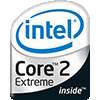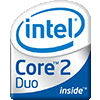
Intel Core i3-2350M Benchmark, test e specifiche
Ultimo aggiornamento:
Il Intel Core i3-2350M ha 2 core con 4 thread ed è basato sul 2. Gene della serie Intel Core i3. Il processore utilizza una scheda madre con il socket PPGA 988 ed è stato rilasciato in Q4/2011. Intel Core i3-2350M ottiene 449 punti nel benchmark single-core di Geekbench 5. Nel benchmark multi-core di Geekbench 5, il risultato è 1.019 punti.

| Cognome: | Intel Core i3-2350M |
|---|---|
| Famiglia: | Intel Core i3 (205) |
| Gruppo CPU: | Intel Core i 2000M (46) |
| Architettura : | Sandy Bridge H |
| Segmento: | Mobile |
| Generazione: | 2 |
| Predecessore: | -- |
| Successore: | -- |
CPU Cores e frequenza di base
Intel Core i3-2350M ha 2 core CPU e può calcolare 4 thread in parallelo. La frequenza di clock di Intel Core i3-2350M è 2,30 GHz. Il numero di core della CPU influisce notevolmente sulla velocità del processore ed è un importante indicatore delle prestazioni.
| CPU Cores / Threads: | 2 / 4 |
|---|---|
| Architettura principale: | normal |
| Cores: | 2x |
| Hyperthreading / SMT: | Si |
|---|---|
| Overclocking: | No |
| Frequenza: | 2,30 GHz |
| Turbo Frequenza (1 Core ): | -- |
| Turbo Frequenza (2 Cores): | -- |
Grafica interna
Intel Core i3-2350M ha una grafica integrata, chiamata iGPU in breve. Nello specifico, Intel Core i3-2350M utilizza Intel HD Graphics 3000, che ha 96 texture shader e 12 unità di esecuzione. L'iGPU utilizza la memoria principale del sistema come memoria grafica e si trova sul die del processore.
| nome GPU: | Intel HD Graphics 3000 |
|---|---|
| Frequenza GPU : | 0,65 GHz |
| GPU (Turbo ): | 1,15 GHz |
| Unità di esecuzione: | 12 |
| Shader: | 96 |
| Hardware Raytracing: | No |
| Data di lancio : | Q1/2011 |
| Max. visualizzazioni: | 2 |
|---|---|
| Generation: | 6 |
| Direct X: | 10.1 |
| Tecnologia : | 32 nm |
| Max. GPU Memoria: | 2 GB |
| Frame Generation: | No |
Hardware codec support
Un codec fotografico o video accelerato nell'hardware può accelerare notevolmente la velocità di lavoro di un processore e prolungare la durata della batteria di notebook o smartphone durante la riproduzione di video.
| h265 / HEVC (8 bit): | No |
|---|---|
| h265 / HEVC (10 bit): | No |
| h264: | Decodificare / Codificare |
| VP8: | No |
| VP9: | No |
| AV1: | No |
|---|---|
| AVC: | Decodificare / Codificare |
| VC-1: | Decodificare |
| JPEG: | No |
Memoria & PCIeIl processore può utilizzare fino a 16 GB memoria in 2 (Dual Channel) canali di memoria. La larghezza di banda massima della memoria è 21,3 GB/s. Il tipo di memoria e la quantità di memoria possono influire notevolmente sulla velocità del sistema. |
|
| Tipo di memoria : | Banda di memoria: |
|---|---|
| DDR3-1333 | 21,3 GB/s |
| Max. Memoria: | 16 GB |
| Canali di memoria : | 2 (Dual Channel) |
| ECC: | No |
| PCIe: | 2.0 x 16 |
| PCIe Larghezza di banda: | 8,0 GB/s |
Gestione termicaLa potenza di progettazione termica (TDP in breve) del processore è 35 W. Il TDP specifica la soluzione di raffreddamento necessaria per raffreddare sufficientemente il processore. Il TDP di solito dà un'idea approssimativa dell'effettivo consumo energetico della CPU. |
|
|---|---|
| TDP (PL1 / PBP): | 35 W |
| TDP (PL2): | -- |
| TDP up: | -- |
| TDP down: | -- |
| Tjunction max.: | 85 °C |
Dettagli tecnici
Il Intel Core i3-2350M è realizzato in 32 nm. Più piccolo è il processo di produzione di una CPU, più è moderna ed efficiente dal punto di vista energetico. Nel complesso, il processore ha 3,00 MB cache. Una cache di grandi dimensioni può accelerare notevolmente la velocità del processore in alcuni casi, ad esempio nei giochi.
| Tecnologia : | 32 nm |
|---|---|
| Design a chip: | Monolitico |
| Presa: | PPGA 988 |
| L2-Cache: | -- |
| L3-Cache: | 3,00 MB |
| AES-NI: | Si |
| Sistemi operativi: | Windows 10, Linux |
| Virtualizzazione: | VT-x, VT-x EPT |
|---|---|
| Set di istruzioni (ISA): | x86-64 (64 bit) |
| Estensioni ISA: | SSE4.1, SSE4.2, AVX |
| Data di lancio : | Q4/2011 |
| Prezzo di rilascio: | -- |
| Numero di parte: | -- |
| Documenti: | Scheda tecnica |
Valuta questo processore
Risultati di benchmark

I risultati del benchmark per Intel Core i3-2350M sono stati attentamente controllati da noi. Pubblichiamo solo risultati di benchmark che sono stati creati da noi o che sono stati inviati da un visitatore e poi controllati da un membro del team. Tutti i risultati sono basati e rispettano le nostre linee guida di benchmark.
Geekbench 5, 64bit (Single-Core)
Geekbench 5 è un benchmark multi-piattaforma che usa in modo intensivo la memoria del sistema.Il test single-core utilizza solo un nucleo elaborativo della CPU. A tal fine, il numero di nuclei elaborativi o la capacità di hyperthreading non sono rilevanti.

|
Intel Core 2 Extreme QX9770
4C 4T @ 3,20 GHz |
||

|
Intel Pentium 3805U
2C 2T @ 1,90 GHz |
||

|
Intel Celeron J4105
4C 4T @ 2,50 GHz |
||
|
|
Intel Core i3-2350M
2C 4T @ 2,30 GHz |
||

|
Intel Core i7-2610UE
2C 4T @ 2,40 GHz |
||

|
Intel Core i3-2348M
2C 4T @ 2,30 GHz |
||

|
Intel Core i3-4025U
2C 4T @ 1,90 GHz |
||
Geekbench 5, 64bit (Multi-Core)
Geekbench 5 è un benchmark multi-piattaforma che usa in modo intensivo la memoria del sistema.Il test multi-core coinvolge tutti i nuclei elaborativi della CPU e si avvale del hyperthreading.

|
Apple A9
2C 2T @ 1,85 GHz |
||

|
Intel Pentium 3550M
2C 2T @ 2,30 GHz |
||

|
AMD Athlon II X4 600e
4C 4T @ 2,20 GHz |
||
|
|
Intel Core i3-2350M
2C 4T @ 2,30 GHz |
||

|
Intel Core i3-2348M
2C 4T @ 2,30 GHz |
||

|
Intel Celeron 3955U
2C 2T @ 2,00 GHz |
||

|
Intel Core 2 Quad Q6400
4C 4T @ 2,13 GHz |
||
Geekbench 6 (Single-Core)
Geekbench 6 è un punto di riferimento per computer, notebook e smartphone moderni. Ciò che è nuovo è un utilizzo ottimizzato delle architetture CPU più recenti, ad esempio basate sul concetto big.LITTLE e combinando core CPU di diverse dimensioni. Il benchmark single-core valuta solo le prestazioni del core della CPU più veloce, il numero di core della CPU in un processore è irrilevante qui.

|
Intel Celeron J4005
2C 2T @ 2,70 GHz |
||

|
Intel Pentium Silver J5005
4C 4T @ 2,80 GHz |
||

|
Intel Core i3-2100T
2C 4T @ 2,50 GHz |
||
|
|
Intel Core i3-2350M
2C 4T @ 2,30 GHz |
||

|
Intel Core i3-2348M
2C 4T @ 2,30 GHz |
||

|
Intel Core i5-2467M
2C 4T @ 2,30 GHz |
||

|
Intel Celeron 3867U
2C 2T @ 1,80 GHz |
||
Geekbench 6 (Multi-Core)
Geekbench 6 è un punto di riferimento per computer, notebook e smartphone moderni. Ciò che è nuovo è un utilizzo ottimizzato delle architetture CPU più recenti, ad esempio basate sul concetto big.LITTLE e combinando core CPU di diverse dimensioni. Il benchmark multi-core valuta le prestazioni di tutti i core della CPU del processore. I miglioramenti del thread virtuale come AMD SMT o l'Hyper-Threading di Intel hanno un impatto positivo sul risultato del benchmark.

|
Intel Celeron 3965U
2C 2T @ 2,20 GHz |
||

|
Intel Pentium 3560M
2C 2T @ 2,40 GHz |
||

|
AMD GX-420GI
4C 4T @ 2,00 GHz |
||
|
|
Intel Core i3-2350M
2C 4T @ 2,30 GHz |
||

|
Intel Core i3-2348M
2C 4T @ 2,30 GHz |
||

|
Samsung Exynos 7884
8C 8T @ 1,60 GHz |
||

|
Intel Pentium G2010
2C 2T @ 2,80 GHz |
||
Cinebench R20 (Single-Core)
Cinebench R20 è il successore di Cinebench R15 ed è anch'esso basato su Cinema 4D. Cinema 4D è un software usato a livello mondiale per creare forme in 3D. Il test single-core utilizza solo un nucleo elaborativo della CPU. A tal fine, il numero di nuclei elaborativi o la capacità di hyperthreading non sono rilevanti.

|
Intel Pentium Silver N5000
4C 4T @ 2,70 GHz |
||

|
AMD Phenom II X4 940
4C 4T @ 3,00 GHz |
||

|
AMD Phenom II X4 945
4C 4T @ 3,00 GHz |
||
|
|
Intel Core i3-2350M
2C 4T @ 2,30 GHz |
||

|
Intel Celeron N4120
4C 4T @ 2,60 GHz |
||

|
AMD FX-8100
8C 8T @ 3,70 GHz |
||

|
Intel Core m3-6Y30
2C 4T @ 2,20 GHz |
||
Cinebench R20 (Multi-Core)
Cinebench R20 è il successore di Cinebench R15 ed è anch'esso basato su Cinema 4D. Cinema 4D è un software usato a livello mondiale per creare forme in 3D. Il test multi-core coinvolge tutti i nuclei elaborativi della CPU e si avvale del hyperthreading.

|
Intel Pentium G3258
2C 2T @ 3,20 GHz |
||

|
AMD Athlon II X4 600e
4C 4T @ 2,20 GHz |
||

|
Intel Core i7-3667U
2C 4T @ 3,00 GHz |
||
|
|
Intel Core i3-2350M
2C 4T @ 2,30 GHz |
||

|
Intel Core m5-6Y57
2C 4T @ 2,20 GHz |
||

|
Intel Core m3-8100Y
2C 4T @ 1,10 GHz |
||

|
Intel Celeron N4120
4C 4T @ 2,50 GHz |
||
iGPU - Prestazioni FP32 (GFLOPS a precisione singola)
Le prestazioni di calcolo teoriche dell'unità grafica interna del processore con precisione semplice (32 bit) in GFLOPS. GFLOPS indica quanti miliardi di operazioni in virgola mobile che l'iPPU può eseguire al secondo.

|
Intel Core i3-2348M
Intel HD Graphics 3000 @ 1,15 GHz |
||

|
Intel Core i3-2370M
Intel HD Graphics 3000 @ 1,15 GHz |
||

|
Intel Core i5-2467M
Intel HD Graphics 3000 @ 1,15 GHz |
||
|
|
Intel Core i3-2350M
Intel HD Graphics 3000 @ 1,15 GHz |
||

|
MediaTek Helio X30
PowerVR 7XTP-MT4 (GT7400 Plus) @ 0,85 GHz |
||

|
Intel Core i7-3689Y
Intel HD Graphics 4000 @ 0,85 GHz |
||

|
Intel Core i3-3229Y
Intel HD Graphics 4000 @ 0,85 GHz |
||
Risultati stimati da PassMark CPU Mark
Alcune delle CPU elencate di seguito sono stati sottoposti a benchmarking da CPU-monkey. Tuttavia, la maggior parte delle CPU non sono state testate e i risultati sono stati stimati utilizzando una formula segreta di proprietà di CPU-monkey. Come tali, essi non riflettono con precisione i valori attuali di Passmark CPU Mark e non sono stati approvati da PAssMark Software Pty Ltd.

|
Intel Core i3-3227U
2C 4T @ 1,90 GHz |
||

|
MediaTek Helio P10
8C 8T @ 2,00 GHz |
||

|
Qualcomm Snapdragon 450
8C 8T @ 1,80 GHz |
||
|
|
Intel Core i3-2350M
2C 4T @ 2,30 GHz |
||

|
Intel Core i3-2348M
2C 4T @ 2,30 GHz |
||

|
Intel Celeron 1020E
2C 2T @ 2,20 GHz |
||

|
AMD Athlon II X2 270
2C 2T @ 3,40 GHz |
||
CPU-Z Benchmark 17 (Multi-Core)
Il benchmark CPU-Z misura le prestazioni di un processore misurando il tempo impiegato dal sistema per completare tutti i calcoli del benchmark. Più velocemente viene completato il benchmark, maggiore è il punteggio.

|
AMD Athlon II X4 640
4C 4T @ 3,00 GHz |
||

|
AMD A12-9720P
4C 4T @ 2,70 GHz |
||

|
Intel Pentium G2010
2C 2T @ 2,80 GHz |
||
|
|
Intel Core i3-2350M
2C 4T @ 2,30 GHz |
||

|
Intel Core2 Duo E8500
2C 2T @ 3,16 GHz |
||

|
Intel Celeron G1620
2C 2T @ 2,70 GHz |
||

|
Intel Pentium E5800
2C 2T @ 3,20 GHz |
||
Cinebench R15 (Single-Core)
Cinebench R15 è il successore di Cinebench 11.5 ed è anch'esso basato su Cinema 4D. Cinema 4D è un software usato a livello mondiale per creare forme in 3D. Il test single-core utilizza solo un nucleo elaborativo della CPU. A tal fine, il numero di nuclei elaborativi o la capacità di hyperthreading non sono rilevanti.

|
AMD Phenom II X2 550
2C 2T @ 3,10 GHz |
||

|
AMD A9-9420
2C 2T @ 3,60 GHz |
||

|
Intel Celeron G1610T
2C 2T @ 2,30 GHz |
||
|
|
Intel Core i3-2350M
2C 4T @ 2,30 GHz |
||

|
AMD Phenom II X6 1045T
6C 6T @ 3,20 GHz |
||

|
AMD Athlon II X4 740
4C 4T @ 3,70 GHz |
||

|
Intel Celeron J4125
4C 4T @ 2,70 GHz |
||
Cinebench R15 (Multi-Core)
Cinebench R15 è il successore di Cinebench 11.5 ed è anch'esso basato su Cinema 4D. Cinema 4D è un software usato a livello mondiale per creare forme in 3D. Il test multi-core coinvolge tutti i nuclei elaborativi della CPU e si avvale del hyperthreading.

|
Intel Celeron N4120
4C 4T @ 2,50 GHz |
||

|
Intel Pentium G2020
2C 2T @ 2,90 GHz |
||

|
Intel Pentium J4205
4C 4T @ 2,40 GHz |
||
|
|
Intel Core i3-2350M
2C 4T @ 2,30 GHz |
||

|
AMD A10-8700P
4C 4T @ 3,20 GHz |
||

|
Intel Core i3-4030U
2C 4T @ 1,90 GHz |
||

|
Intel Celeron G1820
2C 2T @ 2,70 GHz |
||
Benchmarks

Geekbench 5 (SC)
2.488 inserimenti
2.488 inserimenti

Geekbench 5 (MC)
2.461 inserimenti
2.461 inserimenti

Geekbench 6 (SC)
1.755 inserimenti
1.755 inserimenti

Geekbench 6 (MC)
1.703 inserimenti
1.703 inserimenti

Cinebench R20 (SC)
656 inserimenti
656 inserimenti

Cinebench R20 (MC)
604 inserimenti
604 inserimenti

FP32 SP (iGPU)
2.042 inserimenti
2.042 inserimenti

PassMark CPU-Mark
2.392 inserimenti
2.392 inserimenti

CPU-Z Benchmark 17 (MC)
733 inserimenti
733 inserimenti

Cinebench R15 (SC)
1.106 inserimenti
1.106 inserimenti

Cinebench R15 (MC)
1.101 inserimenti
1.101 inserimenti

Cinebench R11.5 (SC)
825 inserimenti
825 inserimenti

Cinebench R11.5 (MC)
836 inserimenti
836 inserimenti
Confronti più popolari
Torna all'indice





